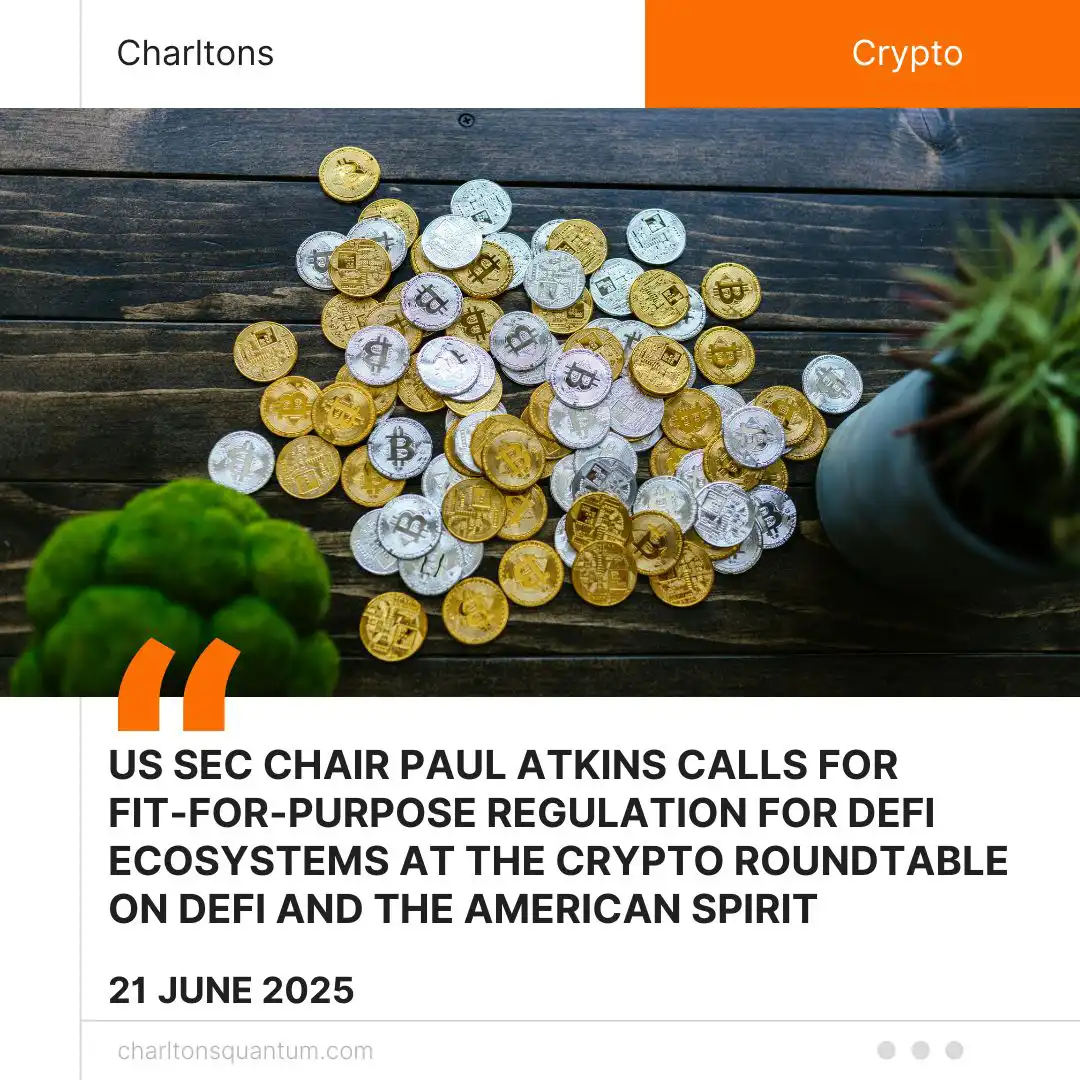
On 9 June 2025, at the United States Crypto Task Force Roundtable titled “DeFi and the American Spirit,” U.S. Securities and Exchange Commission (US SEC) Chairman Paul S. Atkins delivered an address where he called for a principled regulatory shift: from reactive enforcement to forward-looking rulemaking tailored to the innovations of blockchain technology.
In 1803, US President Thomas Jefferson dispatched Lewis and Clark to map the untamed Louisiana Territory, a bold wager on America’s boundless potential. US SEC Chairman Paul S. Atkins stood at a similar crossroads, addressing the US Crypto Task Force’s “DeFi and the American Spirit” roundtable. Atkins described decentralized finance (DeFi) as the next great American experiment ‘a fusion of economic liberty, private property, and innovation’ encoded in blockchain’s potential and use cases.
The DeFi Dawn: A Blockchain Revolution
Atkins began by celebrating blockchain as a “potentially revolutionary innovation,” a shared ledger that redefines ownership without intermediaries. Crypto assets, he explained, are digital property validated by peer-to-peer networks, not central gatekeepers. Miners and validators, incentivized by market-based fees, maintain these systems, adding transactions to “blocks” of finite data. DeFi for example Aave’s lending or Uniswap’s swaps, extends this vision, enabling private, code-driven transactions that bypass traditional finance’s tollbooths.
Atkins’ framed blockchain as a free-market marvel is a masterstroke, echoing America’s entrepreneurial spirit. By likening DeFi to a digital homestead, he taps into the ethos of staking one’s claim. His nod to blockchain’s resilience, thriving where centralized platforms faltered, positions DeFi as a rugged, reliable frontier, ready to reshape finance.
“The American values of economic liberty, private property rights, and innovation are in the DNA of the DeFi movement.” – Paul S. Atkins
A Break from Regulatory Shackles
Atkins didn’t shy from critique, and according to him the prior administration, stifled DeFi with lawsuits, speeches, and regulatory threats, branding miners, validators, and staking providers as securities violators. He praised the US SEC’s Division of Corporation Finance for clarifying that proof-of-work and proof-of-stake activities fall outside securities laws but stressed this isn’t enough. A formal US SEC rule, grounded in congressional authority, is needed to cement this freedom. Atkins’ call for rulemaking, and severing chains forged by “regulation by enforcement.” His critique channels the American spirit of resisting overreach, akin to colonists defying royal edicts. By demanding a rule with legal teeth, he ensures DeFi’s pioneers can build without fear of regulatory ambushes.
Self-Custody: The Digital Right to Property
In his statement he discussed on self-custody, holding crypto assets in personal digital wallets. This, he declared, is a “foundational American value” of private property that must endure online. Intermediaries, with their fees and restrictions, often hinder staking or on-chain activities. Atkins advocated for greater flexibility, freeing users from unnecessary middlemen.
“The right to have self-custody of one’s private property is a foundational American value that should not disappear when one logs onto the internet,” he said.
This defence of wallet sovereignty is a striking departure from previous regulatory rhetoric that had cast a cloud over non-custodial wallets. His push for flexibility evokes the United States Homestead Act, empowering individuals to claim their digital plot. This stance could unleash a wave of wallet innovation, making DeFi accessible to everyone.
Code as Freedom: Protecting Developers
Atkins while speaking on code as freedom, went further arguing that developers publishing DeFi software self-executing code for wallets or protocols shouldn’t face securities laws. Quoting a court ruling, he likened developers to carmakers, not liable for a driver’s misdeeds. Blockchain’s “science fiction” promise software that runs without operators, controlled by no one demands a regulatory rethink.
The Chairman acknowledged that self-executing smart contracts, commonly referred to as autonomous or “on-chain” financial systems may not fit neatly within the US SEC’s traditional regulatory architecture, which is largely structured around intermediaries. He warned against regulatory inertia stifling innovation and promoted the need to evolve policy responses for peer-to-peer software systems.
“We should not allow century-old regulatory frameworks to stifle innovation… These on-chain self-executing software systems have proven to be resilient in the face of crises… They continued to operate as designed pursuant to open-source code.”
The Innovation Exemption: A Safe Harbor for Pioneers
Atkins discussed the idea of a conditional exemptive relief framework or “innovation exemption” that would allow developers and firms to launch on-chain financial products under specified conditions, avoiding the burdens of full-scale US SEC registration.
Perhaps the most consequential portion of Chairman Atkins’ address was his direction to US SEC staff to explore both rulemaking and conditional exemptive relief, dubbed an “innovation exemption,” which would allow qualified DeFi operators to launch products under specified compliance conditions. This proposal mirrors regulatory sandboxes found in other jurisdictions.
“I have directed the staff to consider a conditional exemptive relief framework… An innovation exemption could help fulfil President Trump’s vision to make America the ‘crypto capital of the planet.”
(Source: https://www.sec.gov/newsroom/speeches-statements/atkins-remarks-defi-roundtable-060925)





